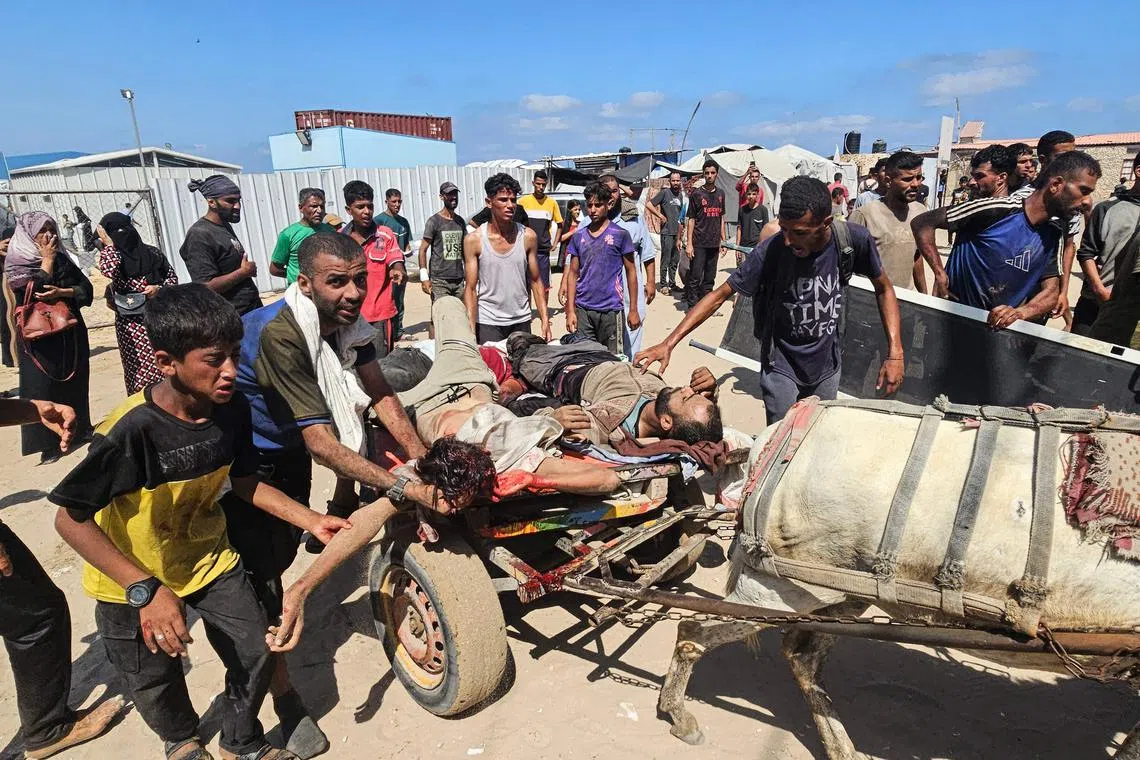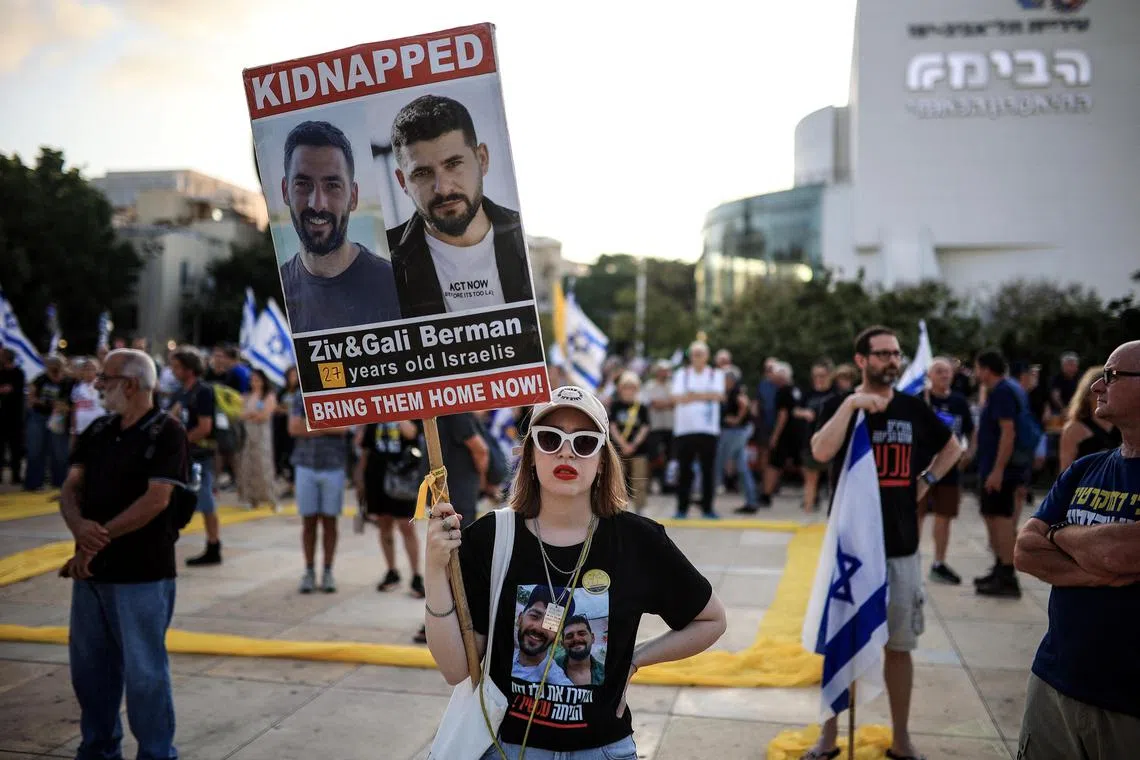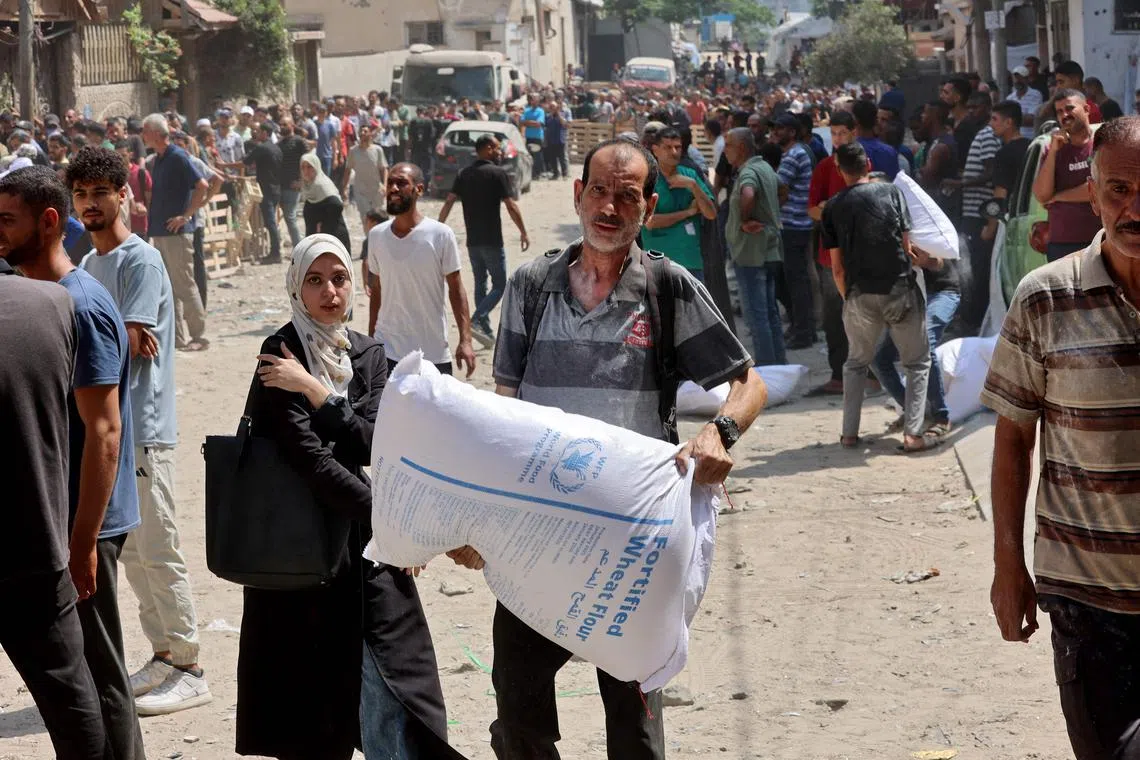Gaza truce talks hang in the balance as Israel and Hamas trade blame
Sign up now: Get ST's newsletters delivered to your inbox

Injured Palestinians being taken to a Red Cross clinic in Rafah, in the southern Gaza Strip, after they were reportedly shot while waiting to receive food parcels at an aid distribution point on July 12.
PHOTO: AFP
- Ceasefire talks between Hamas and Israel are struggling, with both sides accusing each other of blocking a deal for a 60-day pause in fighting.
- Israel wants to keep troops in Gaza, while Hamas demands full withdrawal. "Hamas delegation will not accept the Israeli maps," a Palestinian source told AFP.
- Conflict continues amid deaths reported, calls for a hostage deal, and mediators seeking a solution until Mr Steve Witkoff arrives.
AI generated
GAZA CITY, Palestinian Territories - Gaza ceasefire talks hung in the balance as Hamas and Israel on July 12 accused the other of blocking attempts to strike a deal, nearly a week into an attempt to halt 21 months of bitter fighting in the Palestinian territory.
A Palestinian source with knowledge of the indirect talks in Qatar told AFP that Israel’s proposals to keep its troops in the war-torn territory were holding up a deal for a 60-day pause.
But on the Israeli side, a senior political official, also speaking on condition of anonymity due to the sensitivities of the talks, accused the militants of inflexibility and deliberately trying to scuttle an accord.
On the ground, Gaza’s civil defence agency said at least 38 people were killed across the territory on July 12, including in an overnight air strike on an area sheltering the displaced.
“While we were sleeping, there was an explosion... where two boys, a girl and their mother were staying,” Mr Bassam Hamdan told AFP after the attack in an area of Gaza City.
“We found them torn to pieces, their remains scattered,” he added.
In southern Gaza, bodies covered in white plastic sheets were taken to Nasser Hospital in Khan Younis, while the wounded in Rafah were taken for treatment by donkey cart, on stretchers or carried.
In Tel Aviv, thousands took to the streets, urging the government to seal a hostage release deal.
“The window of opportunity... is open now, and it won’t be for long,” said Mr Eli Sharabi, who was freed in February.

Israelis demanding that their government secure the release of all hostages being held in Gaza, in Tel Aviv, on July 12.
PHOTO: REUTERS
Both Hamas and Israel have said that 10 hostages, held since the militants’ Oct 7, 2023, attack
Israeli Prime Minister Benjamin Netanyahu said he was prepared then to enter talks for a more permanent end to hostilities.
Enclave plans?
But one Palestinian source said Israel’s refusal to accept Hamas’ demand for a complete withdrawal of troops from Gaza was holding back progress in the talks.
A second source said mediators had asked both sides to postpone discussions until US President Donald Trump’s special envoy, Mr Steve Witkoff, arrives in the Qatari capital.
The first source said Israel was proposing to maintain its military in more than 40 per cent of the Palestinian territory, forcing hundreds of thousands of displaced Palestinians into a small area near the city of Rafah, on the border with Egypt.
“Hamas’ delegation will not accept the Israeli maps... as they essentially legitimise the reoccupation of approximately half of the Gaza Strip and turn Gaza into isolated zones with no crossings or freedom of movement,” they said.
Israeli media reported that new maps would be presented on July 13, quoting an unnamed foreign official with knowledge of the details.
A senior Israeli political official countered later that it was Hamas that rejected what was on the table, accusing the group of “creating obstacles” and “refusing to compromise” with the aim of “sabotaging the negotiations”.
“Israel has demonstrated a willingness to show flexibility in the negotiations, while Hamas remains intransigent, clinging to positions that prevent the mediators from advancing an agreement,” the official added, in a statement sent to AFP.

A Palestinian man carrying a bag of flour from a UN World Food Programme warehouse in Gaza City, on July 12.
PHOTO: AFP
The Hamas attacks on Israel in 2023 resulted in the deaths of at least 1,219 people, most of them civilians, according to an AFP tally based on Israeli figures.
Of the 251 hostages seized, 49 are still being held, including 27 the Israeli military says are dead.
At least 57,882 Palestinians, also mostly civilians, have been killed since the start of the war, according to the Health Ministry in Hamas-run Gaza.
Military operations
The Israeli military said on July 12 that it had attacked “approximately 250 terrorist targets throughout the Gaza Strip” in the previous 48 hours.
It said fighter jets hit “over 35 Hamas terror targets” around Beit Hanoun in northern Gaza.
Two previous ceasefires – a week-long truce beginning in late November 2023 and a two-month one from mid-January 2024 – saw 105 hostages released in exchange for hundreds of Palestinian prisoners.
The second Palestinian source said “some progress” had been made in the latest talks on plans for releasing Palestinian prisoners held by Israel and getting more aid to Gaza.
Mr Netanyahu, who is under domestic and international pressure to end the war, said this week that neutralising Hamas as a security threat was a prerequisite for any long-term ceasefire talks.
That included disarmament, he said, warning that failure to do so would mean Israel would have to do so by force. AFP


